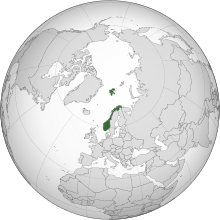|
Telephone numbers in Norway
Telephone numbers in Norway have the country code "+47" and up to the first 2 digits of the phone number will indicate its geographic area. Emergency services are 3 digits long and start with the number "1". Mobile numbers vary in length, either 8 digits or 12 digits.
Historical numbering plan pre-1993Before 1993, telephone numbers would consist either of a two-digit area code and a six-digit subscriber number in cities and large towns, for example, (02) 412702 in Oslo,[1] or a three-digit area code and a five-digit subscriber number in smaller towns, for example, (034) 83000 in Larvik.[2] On 28 January 1993, a closed telephone numbering plan was adopted, with eight-digit telephone numbers incorporating the area code and full number dialling for local and national calls, with Oslo numbers prefixed with the digits '22'.[3] Service numbers were to be three digits long, Directory numbers four digits and some companies were allocated five-digit numbers, ex. 07575. GSM telephony was also introduced in 1993, and those numbers always start with the digits '4' or '9'. Emergency numbersHistorically, the local operator would take emergency calls and forward them to the police, fire or local doctor. In 1964, the emergency number 000 was introduced. In 1985, a modernized emergency service was started at Haukeland hospital in Bergen for Hordaland. In 1986, the emergency numbers changed to 001 for fire brigade, 002 for police and 003 for ambulance. These numbers changed to 110, 112 and 113 in 1994, when the international access code changed from 095 to 00. Landline numbers (as of 2020) Geographic numbers were abolished in January 2020, with Telenor finally switching off the country's copper wire network at the end of 2022.[4] Caller IDs will no longer display the region, but rather say "Norway" or be left blank instead. These numbers are today used by VoIP services.
Non-geographic numbers
Mobile numbers
Emergency
Special numbers
References
Sources
External links
|
||||||||||||||||||||||||||||||
